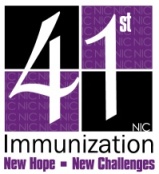
|
|
CDC NIP/NIC Home Page
|
Thursday, March 8, 2007 - 9:05 AM
95
State Immunization Requirements for Juveniles in Detention Facilities
Megan C. Lindley, NIP/ISD/HSREB, Centers for Disease Control and Prevention, 1600 Clifton Rd, NE, MS-E52, Atlanta, GA, USA, Gail A. Horlick, NIP, Immunization Services Division, CDC, 1600 Clifton Rd., NE, MS E-52, Atlanta, GA, USA, Abigail M. Shefer, National Immunization Program, Centers for Disease Control and Prevention, 1600 Clifton Road, NE, MS E-62, Atlanta, GA, USA, Frederic Shaw, OD/OLPHP/PHLP, CDC, 1600 Clifton Rd, MS D30, Atlanta, GA, USA, and Maggie Clemens, Warner, Mayoue, Bates & Nolen, PC, Atlanta, GA, USA.
Learning Objectives for this Presentation:
By the end of the presentation participants will be able to:
1. Describe the prevalence and type of vaccination laws for juvenile detention facilities in the United States.
2. List at least two sources of variation in vaccination laws for juvenile detention facilities.
Background:
Laws requiring immunizations for school entry have been shown to improve child and adolescent vaccination coverage in elementary and middle schools. Little is known about laws requiring immunization for adolescents in settings outside the medical home, such as juvenile detention facilities.
Objectives:
Determine the status of laws, regulations, and other legal requirements relating to immunization in juvenile detention facilities.
Methods:
From September 2004 to June 2005, CDC's Public Health Law Program collected state-specific laws and regulations from all 50 states and Washington, D.C. using Lexis-Nexis and public web-based databases of state statutes and regulations. Data were obtained for a variety of settings; these results focus on juvenile detention facilities. Legal counsel from each state were given the opportunity to comment on the accuracy, completeness, and interpretation of study findings.
Results:
Five states have requirements to assess immunization history for children in juvenile detention facilities. Sixteen states require juveniles in these facilities to be up-to-date with routine vaccinations and boosters; of these 16 states, eight specify medical, religious, or philosophical exemptions to the requirements. In states requiring facilities to provide the needed immunizations, the time period for compliance ranges from vaccination upon admission to 30 days after admission. Most laws noted here are broad requirements applying to groups of facilities that serve, among others, truant or delinquent children. Interpretation of requirements, legal definitions, and departmental responsibility for oversight all vary by state.
Conclusions:
Less than half the states have laws requiring vaccination of incarcerated juveniles. Promoting vaccination in juvenile detention facilities requires understanding how relevant laws are interpreted in each jurisdiction.